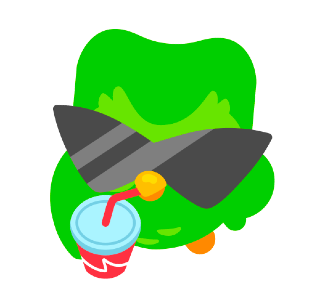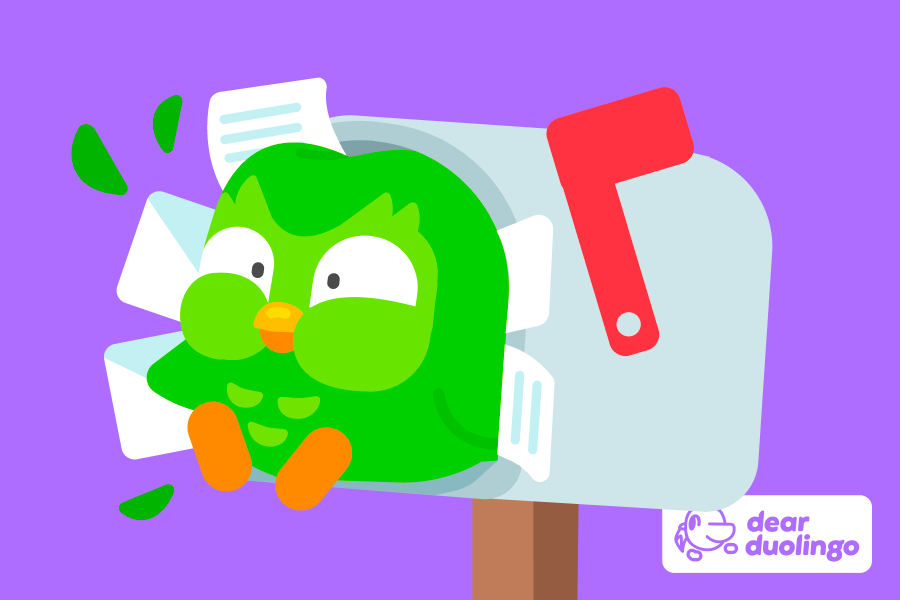Welcome to another week of Dear Duolingo, an advice column just for learners. Catch up on past installments here.
Wassup, learners? This week we’re talking about something with plenty of potential for cringe: slang!
Our question this week:

What an interesting (and timeless) question, What the Slang. In short: yes. But to really understand that very brief answer, we need to dig a little deeper. Why is slang universal? Why don’t certain languages just… not use it? Well, giddy up—we’ve got a lot to unpack.
The function of slang
Slang words are usually easy for us to identify. What’s often less easy is understanding what they mean, and why they exist at all. And that brings us straight to the main function of slang: the creation of social groups.

Think about it—what kind of slang do you know? Maybe you’ve heard African Americans use finna, seen teenagers in the 2010s write lit or bae online, or noticed Mexican Spanish speakers say güey. Maybe you’ve even developed some slang within your own friend group, work team, or among your roommates. Slang is everywhere!
No matter the group, the use of slang marks separation from everyone else. This difference can be based on age, ethnicity, nationality, social class, and anything else shaping people’s identities.
If you’re learning a new language and want to get familiar with its slang, it’s good to be mindful about which slang words are used by which groups. While some slang words can be used pretty freely, it can sometimes come off as rude if you use the slang of a group you don’t belong to. Historically, a lot of slang has originated from oppressed groups (like African Americans and queer folks), marginalized groups (like drug users), and others that tend to lack social power (like young people).
However, this does not in any way mean that the language of these groups is inferior! Some people may think of slang as bad or a sign of a lack of education, but that couldn’t be further from the truth. Words don’t have value on their own, so slang isn’t inherently worse or less correct than more standard language—it simply serves a different purpose. And while marginalized communities are frequently the ones who create slang, they’re not the only ones who use it. Their slang often becomes something everyone wants to use, causing it to spread far beyond its original community.
The life and death of slang ♻️
The word slang itself was originally used to refer to the language of thieves and vagabonds. Over the centuries, its perception and meaning have changed. It slowly became a broader social phenomenon and gained respectability. Today, slang is often seen as cool, and its ties to criminality have faded.
Now, how does slang come into existence? Often, slang words come from standard language and are given a new meaning. For example, the English word wicked traces back to the 13th century, when it took on the meaning “bad” or “evil” in standard language. Today, wicked is also used as slang to mean “excellent” or “awesome.” Similarly, people have been using cool to mean “cold” since the 14th century, but it wasn’t until the 1930s that it became the slang word we still use today, originating in African American English. And while ghost has meant “to haunt” since the early 17th century, only in recent years has it become slang for “to suddenly cut all contact."
Another type of slang is acronyms—IYKYK (if you know you know). These have become especially popular since the rise of social media and texting. We’ve seen acronyms like YOLO (you only live once), SMH (shaking my head), OOTD (outfit of the day), and many, many more. If you think you know what a new acronym means, consider double-checking. There are plenty of stories of well-intentioned grandparents thinking LOL means “lots of love” and posting it in less-than-appropriate places…
Regardless of their form, slang words often have a short lifespan. Youth slang, in particular, tends to lose its status as soon as it spreads beyond the in-group and is used by politicians or companies, for example. Another telltale sign of this loss of status is when major publications or news outlets start explaining youth slang to the general public. In Germany, for example, a reputable publisher presents the “youth word of the year” every year—which is often outdated by the time it’s reported.
Some slang words, however, manage to survive for a long time, like booze (liquor), which surfaced in the 14th century and is still in use today. These words usually become part of colloquial or even standard language. For example, the verb tip (meaning to give somebody an extra bit of money for their service) was considered slang when it arose in the early 18th century. Nowadays, it is considered standard language.
Slang in different languages
There is no way for us to foresee what will become the next slang words. What we do know, though, is that new slang will continue to emerge, and it can look quite different in other languages. For example:
- French. French speakers have come up with a unique system of swapping syllables, called verlan. For example, a word like énervé(angry) becomesvénère!
- German. German youth slang is heavily influenced by other languages—above all English, which gives us Denglish. Languages like Turkish and Arabic also have considerable influence. This can be seen (or rather, heard) in Kiezdeutsch, which follows a different set of grammar rules compared to standard German.
- Japanese. Like in German, English has become an integral part of Japanese slang. English words are often clipped, like apāto, which is short for the English wordapartment. Online, it’s common to see a mix of scripts in Japanese slang. For example,konnichiwa(good day, hello) can be shortened to kon and written as こn—a mix of hiragana and a Roman letter.
- Mandarin Chinese. In Mandarin Chinese, certain number combinations have become part of the online slang repertoire. For example, 1314can be used to mean “forever” because its pronunciation (yīsān yīsì) is similar to that of一生一世(yīshēng yīshì), an idiom meaning “forever.”
- Australian English. Australian English has a lot of strategies for making slang, including shortening words and adding -y/-ie or -o (which is very common). That means presentbecomesprezzie, andmusicianbecomesmuso!
- Emoji. The use of emoji is common worldwide and has become a big help in communicating… just about everything. With that in mind, it’s not surprising that emoji can also be used as slang. This explains why, for example, the skull emoji (💀) has taken on the (additional) meaning of laughing, popularized by Gen Z.
Reading between the lines
Using slang allows us to convey more than what the words themselves mean—it’s a way for us to express our identities. So becoming familiar with the slang of a language can also be a way to connect with its speakers on a deeper level.
For more answers to your slang and learning questions, get in touch with us by emailing dearduolingo@duolingo.com.
